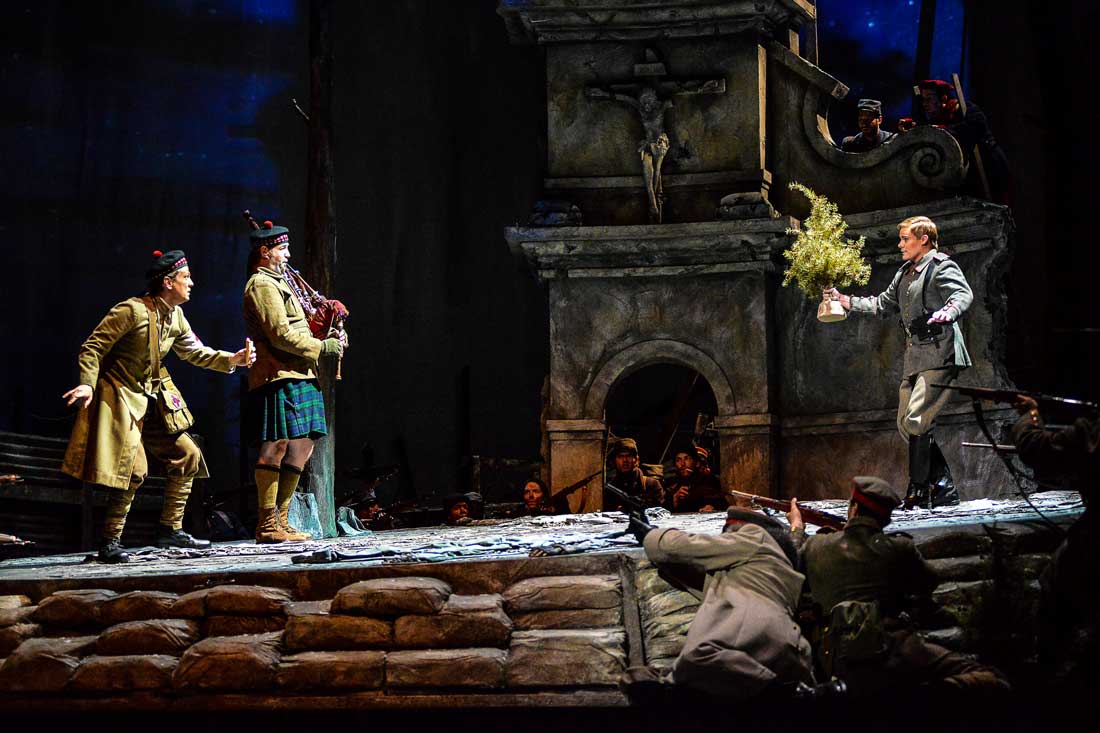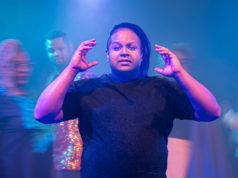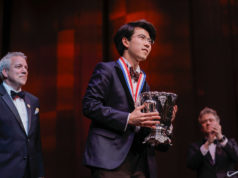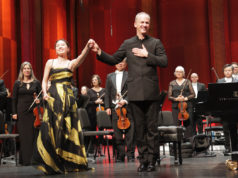If you think movies are guilty of recycling plots, you should take a look at opera. The art form has been borrowing stories since it began centuries ago (think of Monteverdi ripping off Greek mythology and Roman history), and inevitably, composers have started looking for inspiration in the multiplex. The field of operas based on movies is small but growing, and Fort Worth Opera’s ongoing interest in staging contemporary works leaves audiences here in prime position to catch this particular wave. That leads us to Silent Night, Kevin Puts’ adaptation of Christian Carion’s 2006 Oscar-nominated film Joyeux Noël. The film’s appeal as an opera subject is easy to see, having two opera singers as main characters and with music playing such a key role in the story. The results aren’t always happy, but this regional premiere still stands as a proud addition to FWO’s performances of new music.
The story is based not on a specific historical incident but rather on a string of events that took place along the western front of World War I in December 1914. On a field in France near the Belgian border, French and Scottish infantry troops are lined up against Germans, all hunkered down in their respective trenches. When the Scots start singing carols on Christmas Eve, Nikolaus Sprink (Chad Johnson), a famous tenor drafted into the German ranks, responds with his own performance and eventually ventures into no-man’s-land armed with only a Christmas tree and his voice. The holiday spirit and the love of music inspire the leaders of all three armies to call a truce for the night, allowing their soldiers to freely intermingle, celebrate Mass, commiserate about being separated from their loved ones, and listen to a performance by Anna Sørensen (Ava Pine), Nikolaus’ Danish soprano girlfriend who visits him at the front over his objections.
Like the movie, the opera is performed in the characters’ native languages: English, French, and German. This isn’t unusual in cinema, but it’s quite unusual in opera, because writing music to be sung in three different languages requires a composer who can adapt to the distinctive contours, vowels, and nuances of each tongue. Not only do Puts and his librettist Mark Campbell pull off this difficult trick, they show themselves to be even more versatile than the material requires. The 18th-century-style Italian opera that Nikolaus and Anna are performing in at the start might sound like Mozart or Glück, but it’s Puts’ original composition. So is the bagpipe-accompanied Scottish ballad sung by the priest and stretcher-bearer (Christopher Burchett). With such virtuosity on display, it’s no wonder that Silent Night won the 2012 Pulitzer Prize for Music.
From a dramatic standpoint, the central romance gets shorted in favor of the war. Why don’t we see the moment when Nikolaus and Anna reunite after months apart? A driving force in the film, Anna is reduced to a supporting role here, and this already male-heavy story tips further in that direction.
Still, there is more than a bit of beautiful music to make up for it, like the ballad, to which Burchett gives a jaunty performance. Baritone Morgan Smith portrays the French commander and delivers a superb aria as the officer thinks about his wife and the son he has yet to see while filling out paperwork about his dead and wounded men. The Dona Nobis Pacem that Anna sings on the battlefield is also original to the opera, and while Pine can’t erase the memories of Natalie Dessay’s singing in the film (I’m not sure that any soprano in the world could do that), she does phrase the thing beautifully enough to bring tears to your eyes. All the lyricism is cut by Steven Eddy’s tasty little comic turn as the French commander’s eccentric adjutant, who carries an alarm clock and prides himself on making good coffee regardless of the war’s hardships.
On top of that, director Octavio Cardenas brings an innovative and highly efficient staging to this work, with a revolving tilted platform in the middle of the stage serving as an opera stage at the beginning and then turning into no- man’s-land for the rest of the proceedings. A projection onto a scrim in front of the stage nicely breaks up an early tableau, with soldiers in neat formation.
The opera does its best to cut down on the movie’s treacly sententiousness, but it still doesn’t strike nearly as deeply as Jean Renoir’s 1932 film Grand Illusion, a ruthless deconstruction of the 19th-century aristocratic idea (exploded by World War I) that war could be conducted according to a gentleman’s code. Still, Silent Night does offer up the old-fashioned pleasures of good singing, beautiful music, and clever stagecraft that have brought people to the opera house for centuries. Its one remaining performance here is worth a look.
[box_info]
Fort Worth Opera’s Silent Night
Thru Sat at Bass Performance Hall, 555 Commerce St, FW. $30-100. 877-396-7372.
[/box_info]












